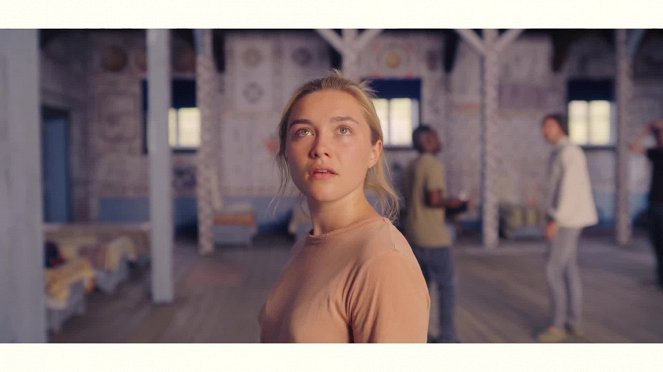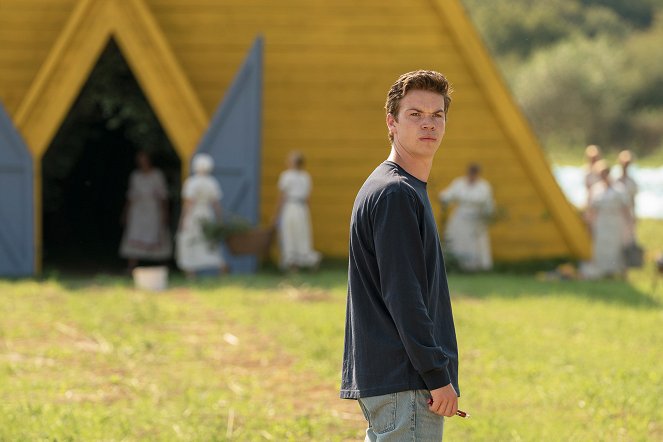Directed by:
Ari AsterScreenplay:
Ari AsterCinematography:
Pawel PogorzelskiComposer:
Bobby KrlicCast:
Florence Pugh, Jack Reynor, Will Poulter, William Jackson Harper, Vilhelm Blomgren, Julia Ragnarsson, Björn Andrésen, Archie Madekwe, Anna Åström (more)VOD (3)
Plots(1)
Following a family tragedy, American student Dani (Florence Pugh) decides to accompany her boyfriend Christian (Jack Reynor) and his friends Mark (Will Poulter), Josh (William Jackson Harper) and Pelle (Vilhelm Blomgren) on a trip to Sweden to take part in a summer solstice festival that only takes place every 90 years. In Pelle's hometown, the friends initially receive a warm welcome but as the ceremonies and rituals get underway they begin to question their hosts' true intentions. (Entertainment in Video)
(more)Videos (5)
Reviews (17)
It's like a modern The Witch meets 1973’s The Wicker Man. Midsommar is a concentrated, poetic, psychological horror film, but it doesn't scare simply by shocking and frightening – it scares by its creeping unpredictability, where we know how someone will end up, yet we have no earthly idea what will happen to them or when. Hereditary rather disappointed me, but Aster's second film has already won it for me by a landslide. The opening, in which we get to know the characters and their relationships, is already impeccable, but after the flight to Sweden it's hard to find words to describe the atmosphere that ensues. And how it is filmed! Imaginative camera angles and editing, long and absorbing shots, plus "live" music and one heathen stranger than the other. I look forward to seeing it again – I know exactly what to focus on.
()
Horror subgenres are bound by traditions, and this applies to “folklore horror" even more. It can’t surprise anyone, if we are talking about a movie that is centred around following and respecting traditions, right? Maybe that's why not many filmmakers are eager to make something like this. Because dealing with the fact that the viewer will know “where the movie is going" is certainly not easy. You will not only know it, but you will expect it and maybe even require it. What's worse, you get into a position where you reluctantly expose your work to the pedestal of cult classics with The Wicker Man at the top. Nevertheless, several good films in this vein have appeared in recent years. Aster's Midsommar is the best of them (although it is paradoxically closer to the new Suspiria than the original The Wicker Man (1973). After all, as with all the best horror movies, “scaring/disturbing" is just a means of looking at ordinary problems. So Midsommar is primarily a chilling psychological study of a dysfunctional relationship/breakup, and what goes hand in hand with that is the fact that this study is disturbing, unpleasant, magnificently shot, enriched with some gore effect and performed in a riveting way.
()
Is it a horror film or is it not a horror film? The short answer is yes and it is damn good. For the long answer, we must first define what a horror film is. Horror movies are not made up of scares (the best ones do not have any at all) or the supernatural (a full range of great horror movies get by without it), and even gory scenes are not unconditionally necessary (as Poltergeist shows). When we come to the full essence, we reach two parallel paths, where one follows the effects on the audience and the other the internal principles of storytelling. On the first path, together with the greats of film criticism and theory, we find that horror is a genre that evokes intense responses in viewers in accordance with the depicted scenes. Linda Williams’s legendary essay likens horror to porn and melodrama, where viewers also observe certain situations that are supposed to elicit their directly proportionate physical response in relation to a given bodily fluid (blood, semen, tears). On the other path into the inner workings of horror stories, we can get to the very essence of horror, which consists in the fact that certain elements penetrate the characters’ inner or outer world, disrupting their deep-rooted values and certainties, which suddenly cease to be valid and the characters have to come to terms with that. The intrusive element may be a serial killer who turns a peaceful suburb into a nightmare or ghosts who turn the characters’ home into a place of life-threatening danger. Besides all manner of classic horror movies, both of these stripped-down definitions can also apply to films that are otherwise assigned to absolutely different categories, from brilliantly disturbing thrillers such as The Hitcher to Ingmar Bergman’s agonising psychological dramas, particularly Persona and Cries and Whispers. Ari Aster took a similar path, whereupon he shot one of the most physically intense and most suggestive horror films of recent years, which thoroughly disturbs the audience by confronting it with a world where completely different values apply and where the most frightening thing happens in broad daylight and inside the main character. Furthermore, Midsommar has phenomenal camera work and dramaturgy, reinforcing the concise vision. After Jordan Peel, we have another significantly distinctive talent who shows us that horror does not have a single universal form, but can rather be a space for original creative realisation.
()
A bizarre mindfuck full of Nordic cults, precise camerawork and a tense atmosphere that gradually builds into an unadulterated inferno. The depiction of violence and murder doesn't matter, on the contrary it is fresh, crisply shot and at times very intense with the help of the music and the skill of the filmmakers. An interesting mix of dark relationship drama, set in even darker interiors and exteriors (the first half), where everyone finds their own thing about both protagonists, and an over-lit feast for the eyes, where everyone is nice before the murders begin. Paradoxically, while the relationship drama has power and tends to emerge from the darkness, the seemingly positive, lavishly photographed natural scenery of the wilderness is full of light, but here the adage that it’s darkest under the candlestick is doubly true. Bold filmmaking that hasn't been here in such a form and with such a unique directorial style for a long time.
()
No sophomore slump this time. With his second feature film, Ari Aster confirms that in recent years there hasn’t been a more significant directorial breakthrough, at least not in the field of the darker genres. Midsommar’s atmosphere is unique, beautiful in its visuals and exciting in the portrayal of the concept of trauma, which the main character is experiencing. And mainly, it’s incredibly, truly incredibly bizarre. Rather than a second Hereditary, what we have here is some sort of perverted sunny fairy-tale, “The Wizard of Oz” for the weirdos, as Aster himself said in an interview. Why then only 4* (for the moment)? After Aster’s first film, I was probably expecting a more radical twist and a sharper horror ending. Midsommar manages to surprise in several individual moments (many of which were of course in the trailer), but as whole it goes in a fairly expected direction. The ending IS mad, but, once again, in a bizarre rather than horrifying manner. I could get over it, but, the fundamental difference with Hereditary is that this time, at least during the first viewing, I wasn’t able to relate to the character of Dani enough to fully comprehend her final mood. To get the meaning of Midsommer, it is absolutely essential that the relationship between Dani and Christian resonate with the viewer. But I was too enchanted by the pagan bizarreness around to live with the characters the crisis in their relationship. So, I hope that the half hour extended version that’s in the works won’t have much more gore, sex and nastiness, but will get deeper into that central relationship. That would work perfectly for me.
()



Ads